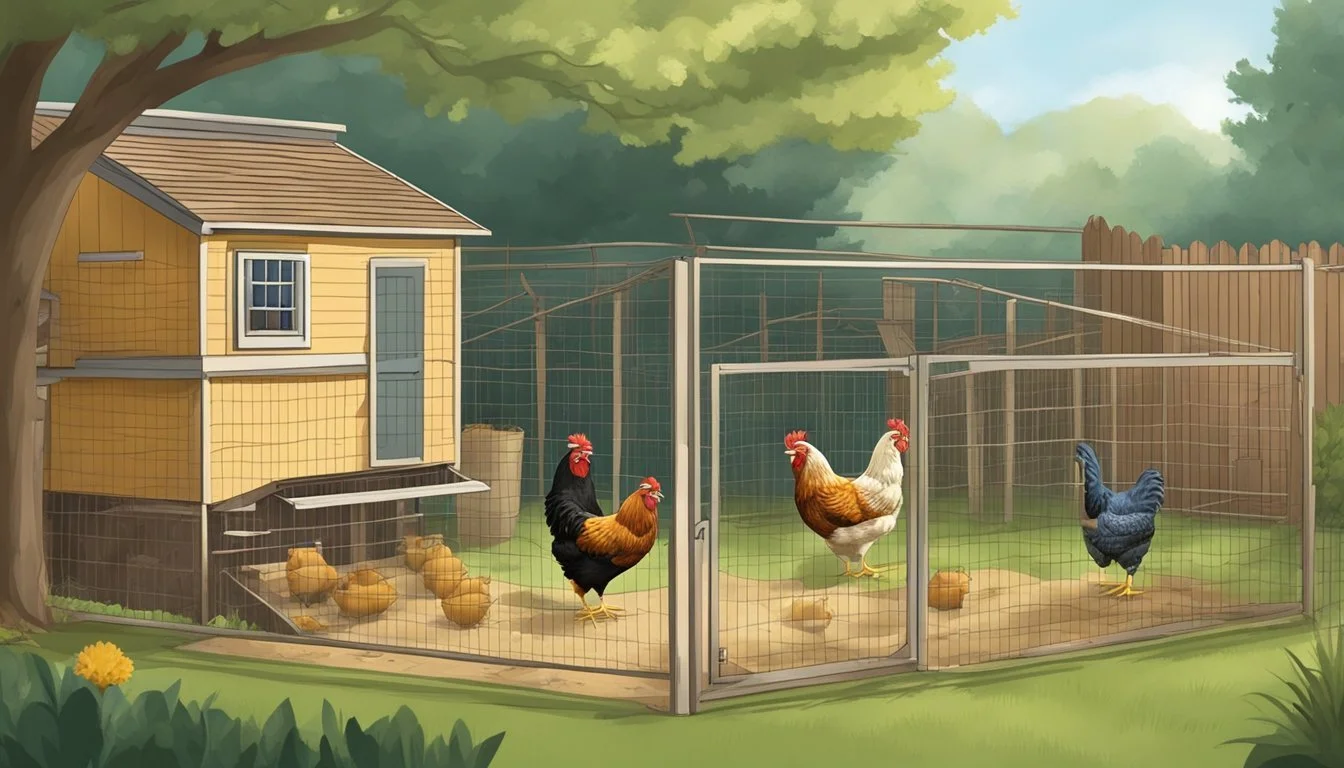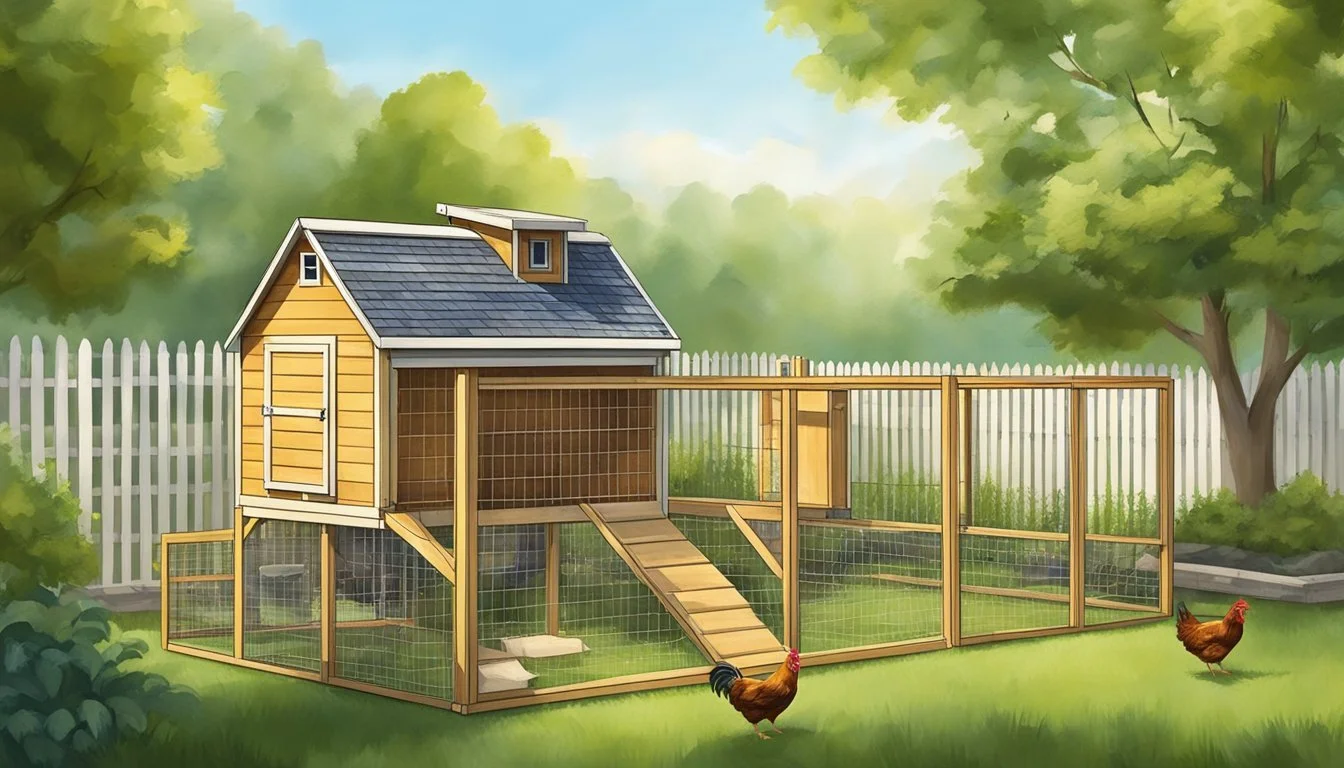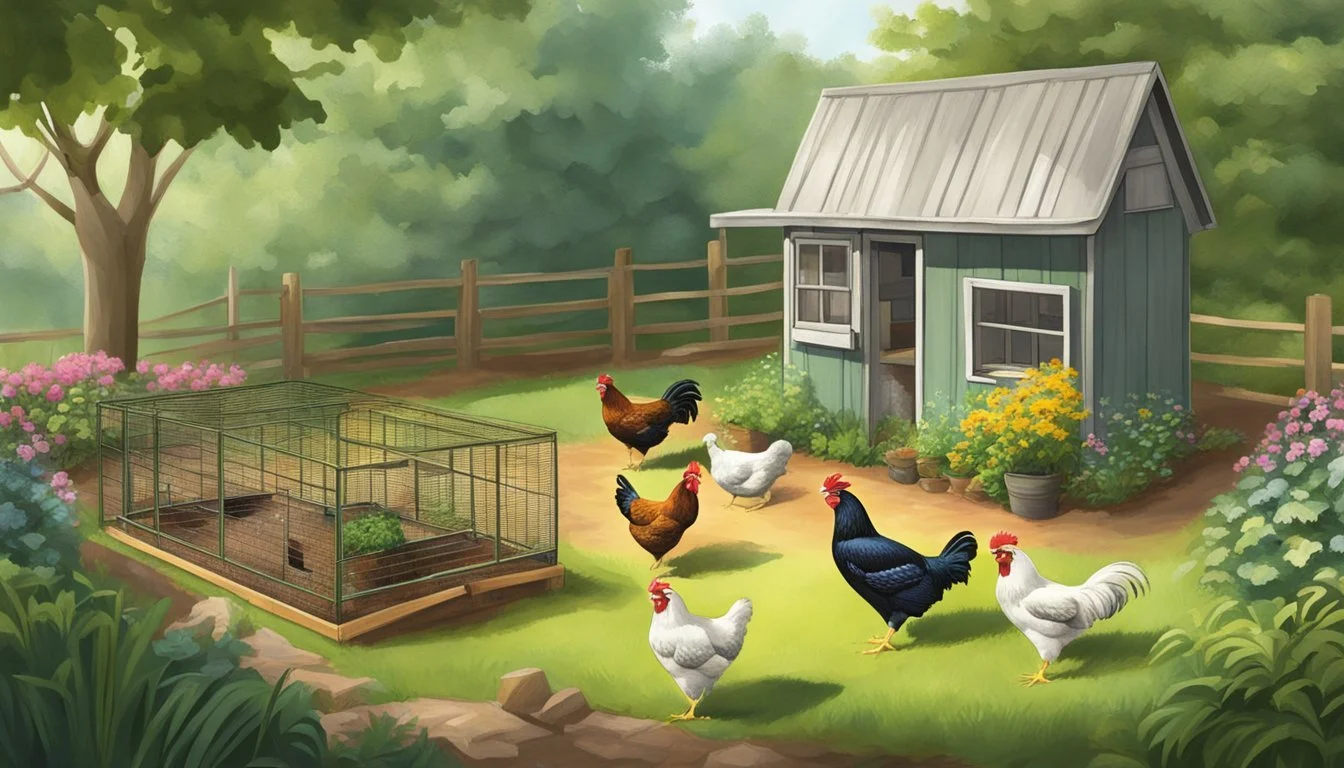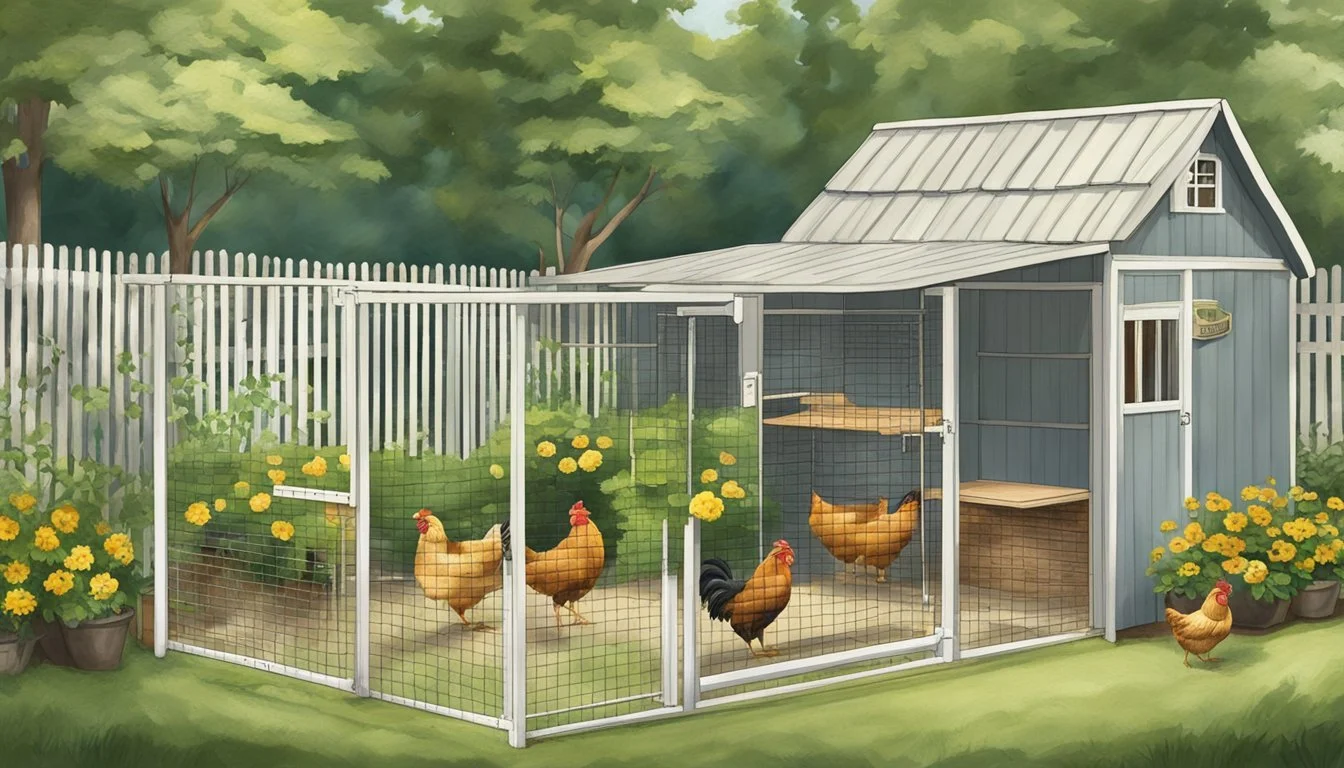Keeping Backyard Chickens in Chattanooga, TN
Essential Tips for Urban Poultry Farmers
In Chattanooga, Tennessee, the practice of raising backyard chickens has specific guidelines that residents must adhere to, as stipulated by the city's ordinances. While the appeal of fresh eggs and the joys of poultry husbandry entice many, prospective chicken keepers in Chattanooga need to be aware of the regulations that govern their hobby. The city ordinance dictates that only female chickens, or laying hens, are permitted within city limits on properties that are not agriculturally zoned, provided these properties are at least 5 acres in size. Additionally, roosters are banned from residential areas due to noise concerns and are only allowed on agriculturally zoned land.
The city's stance on backyard chickens is a careful balance between accommodating the interests of urban farmers and ensuring the comfort and well-being of the community at large. Before starting a backyard flock, potential chicken owners must apply for an annual permit, meeting the requirement of having sufficient land to legally house the birds. These regulations aim to minimize potential nuisances such as noise and odors that could affect neighbors, while still allowing for the responsible raising of chickens within defined parameters.
Understanding and complying with Chattanooga's chicken ordinance is crucial for anyone interested in pursuing this rewarding pastime within the city. While the rules may seem restrictive, especially concerning the land requirement, they serve to ensure that the practice of keeping chickens is consistent with the city's planning and zoning standards, protecting the interests of both the chicken owners and the surrounding community.
Understanding Local Chicken Laws
When keeping backyard chickens in Chattanooga, it's crucial to be aware of the specific local ordinances that apply. These regulations can affect where chickens can be housed, the number allowed, and permissible breeds within Chattanooga city limits.
Chattanooga City Ordinances
In Chattanooga, city ordinances stipulate that laying hens are permissible only on properties that are five acres or larger unless they are situated on agriculturally zoned land. The keeping of roosters is prohibited within the city limits unless the property is also agriculturally zoned.
Permit Requirements in Chattanooga
Residents interested in keeping chickens must comply with permit requirements. This involves verifying zoning regulations and, if necessary, obtaining the appropriate permit to ensure adherence to local laws. It is important to check the current status of permit requirements, as these can evolve over time.
Limits and Restrictions
The number of chickens allowed in Chattanooga is dependent on the zoning ordinances. For properties of at least five acres, there are no restrictions on the number of backyard chickens one can keep. However, in any case, roosters are not allowed except on agriculturally zoned lands to minimize noise disturbances.
Comparing Regulations: Chattanooga vs. Surrounding Areas
Chattanooga's regulations are tailored to its urban environment. Surrounding areas such as Red Bank, Hamilton County, and other nearby municipalities may have their own regulations that differ from those of Chattanooga. For instance, while Nashville and Knoxville might have their unique approach to backyard fowl, Memphis, Clarksville, and Murfreesboro each manage their local laws independently. It is essential for residents to review the rules specific to their area to ensure compliance.
Setting Up Your Chicken Coop
When establishing a chicken coop in Chattanooga, the homeowner must consider specific zoning regulations, ensure predator safety, and maintain proper upkeep for the health and safety of the chickens.
Choosing the Right Location
Finding an appropriate position for a chicken coop requires understanding of both local zoning ordinances and the physical landscape of one's property. In Chattanooga, regulations stipulate that coops must respect property line boundaries and may necessitate agriculturally zoned land, depending on lot size. It's essential to place the coop in a location that is:
Away from neighboring homes to adhere to property line restrictions
In a high-ground area to avoid flooding
Designing a Predator-Resistant Enclosure
A predator-resistant henhouse is vital for the protection of backyard chickens. An enclosure should be robust and secure, with attention to the following details:
Constructed with durable materials to withstand predators
Includes fencing buried at least 12 inches underground to deter burrowing animals
Hardware cloth rather than chicken wire for increased security
Coop Maintenance and Upkeep
Regular maintenance of the chicken coop is crucial to ensure the well-being of both hens and roosters. A well-kept coop minimizes health risks and promotes a thriving environment for egg-laying hens. Key aspects of maintenance include:
Daily clearing of droppings and refreshing of bedding materials
Periodic inspections for damage or wear and necessary repairs
Ensuring adequate ventilation to prevent respiratory issues
Chicken Care and Management
Raising backyard chickens in Chattanooga requires attention to diet, health, and community harmony to ensure that your birds thrive while maintaining good neighbor relations.
Feeding Your Backyard Chickens
Proper nutrition is critical for the health and productivity of backyard chickens. A balanced diet consists of commercially available poultry feed that meets all the bird's nutritional needs. Additionally, poultry keepers may supplement diets with grains and food scraps, though they should avoid giving anything toxic to chickens, such as chocolate, caffeine, or avocados.
Grain: Provides energy and essential nutrients.
Vegetables: Good source of vitamins.
Protein: Necessary for egg production and growth.
Health and Disease Prevention
Regular health check-ups and clean living conditions are vital in preventing disease. Vaccinations play a significant role in protecting the flock from common illnesses. Early detection and treatment of any health issues are crucial to prevent spread.
Keep housing clean: Prevent disease by regularly cleaning the coop.
Vaccinations and Vet Visits: Stay vigilant with regular health checks and vaccinations.
Dealing with Pests
Pests such as mites, lice, and rodents can be problematic for chicken owners. Effective pest management includes keeping the coop clean, using appropriate bedding, and setting traps or baits for rodents in a way that does not harm the chickens.
Clean Coop: Minimizes pests and offensive odors.
Traps: Use responsibly to manage rodents.
Managing Noise and Public Nuisance
Chickens can cause noise, which may disturb neighbors. Implementing quiet times, soundproofing measures for coops, and choosing less noisy breeds can mitigate this issue. Management of waste and odor is also critical to prevent public nuisance.
Quieter Breeds: Consider less vocal breeds to keep noise levels down.
Waste Management: Regular coop cleaning to control odors.
Benefits of Raising Backyard Chickens
Raising backyard chickens in Chattanooga offers tangible benefits, from increasing sustainability to providing educational insights. Here's how keeping a backyard flock can be a positive step for city residents.
Sustainability and Food Security
A key advantage of maintaining backyard chickens is the enhancement of sustainability and food security. With global concerns like climate change and the unexpected challenges evidenced during the COVID-19 pandemic, the significance of local food sources has come to the forefront. Chickens contribute to a closed-loop agricultural system by producing manure that can be composted and used to fertilize gardens, supporting a household’s ability to grow its own produce. Moreover, a backyard flock serves as a reliable source of food via the eggs they produce, reducing dependence on supply chains.
Educational Opportunities
Chickens are not just agricultural assets; they also offer educational opportunities for owners of all ages. The process of raising chickens brings lessons in responsibility, animal care, and the cycles of life and food production. For children, interacting with chickens can help cultivate an understanding of where food comes from—a lesson that has become increasingly vital as urbanization distances people from traditional agriculture practices.
The Joy of Fresh Eggs
One cannot discuss the perks of raising backyard chickens without mentioning the joy of fresh eggs. Fresh eggs are not only tastier but also can be more nutritious than their store-bought counterparts due to the hen's diet and the egg's freshness. Chickens in one's backyard mean that these eggs are readily available, thus enhancing meal quality and ensuring that families can enjoy the benefits of fresh produce literally from their backyard.
Legal Considerations and Community Relations
When keeping backyard chickens in Chattanooga, understanding the local zoning ordinances and fostering good community relations are critical. One must adhere to city codes and agricultural guidelines, which can vary depending on property size and zoning designations.
Navigating Zoning Ordinances
In Chattanooga, zoning ordinances dictate the keeping of backyard chickens. Specifically, female chickens, or laying hens, are allowed within the city limits on properties that are at least 5 acres and not zoned agricultural only if certain conditions are met. These conditions are put in place to ensure that chicken keeping is in harmony with the community and the environment. It is crucial to check the city code to understand whether a property is agriculturally zoned and identify the limitations and requirements for keeping poultry.
Annual Permits and Fees
Residents must be aware that there may be annual permits and associated fees for keeping backyard chickens. While specific details can vary, it is typical for cities to require permits to monitor and regulate poultry within residential areas. These permits help ensure compliance with local laws and provide a means for the city to enforce health and safety standards.
Good Practices for Being a Responsible Chicken Keeper
Maintaining a harmonious relationship with neighbors is just as important as following legal requirements. Here are some good practices:
Maintain cleanliness: Keep chicken coops clean to prevent odors and pests.
Control noise: While roosters are often prohibited due to noise, even hens should be kept in a manner that minimizes disturbances.
Be considerate with coop placement: Position coops away from property lines to reduce any impact on neighbors.
By adhering to these guidelines, residents can enjoy the benefits of keeping chickens while being considerate of their community.
Additional Resources
For residents of Chattanooga interested in keeping backyard chickens, there are valuable resources that offer education and support. These resources can help individuals comply with local regulations, successfully raise their livestock, and connect with a larger community of local and online poultry enthusiasts.
Local Workshops and Events
Chattanooga offers a variety of local workshops and events that provide hands-on education for keeping backyard chickens. These events are often hosted by agricultural organizations or local farms with ample pasture area, giving attendees practical experience. Residents can check with the UT Extension of Hamilton County for upcoming workshops, or visit local farm supply stores for scheduled events.
Upcoming Events:
Chattanooga Urban Chicken Keeping Workshop
Date: March 15, 2024
Location: Urban Farm Chattanooga
Hamilton County Poultry Management Course
Date: April 22, 2024
Location: Hamilton County Extension Office
Online Communities and Support
Online platforms are a boon for backyard chicken keepers, providing instant access to community support and a wealth of information. BackYard Chickens (www.backyardchickens.com) is an expansive online community where residents of Chattanooga can engage with fellow poultry lovers. It's an excellent source for advice on best practices, coop design, and care specific to the region.
Chattanooga Online Resources:
Chattanooga Chicken Enthusiasts (Facebook Group)
A local group specifically for Chattanooga residents to discuss urban chicken keeping.
Tennessee Poultry Forum
A broader forum catering to the entire state, but with a dedicated section for Chattanooga-related discussions.








